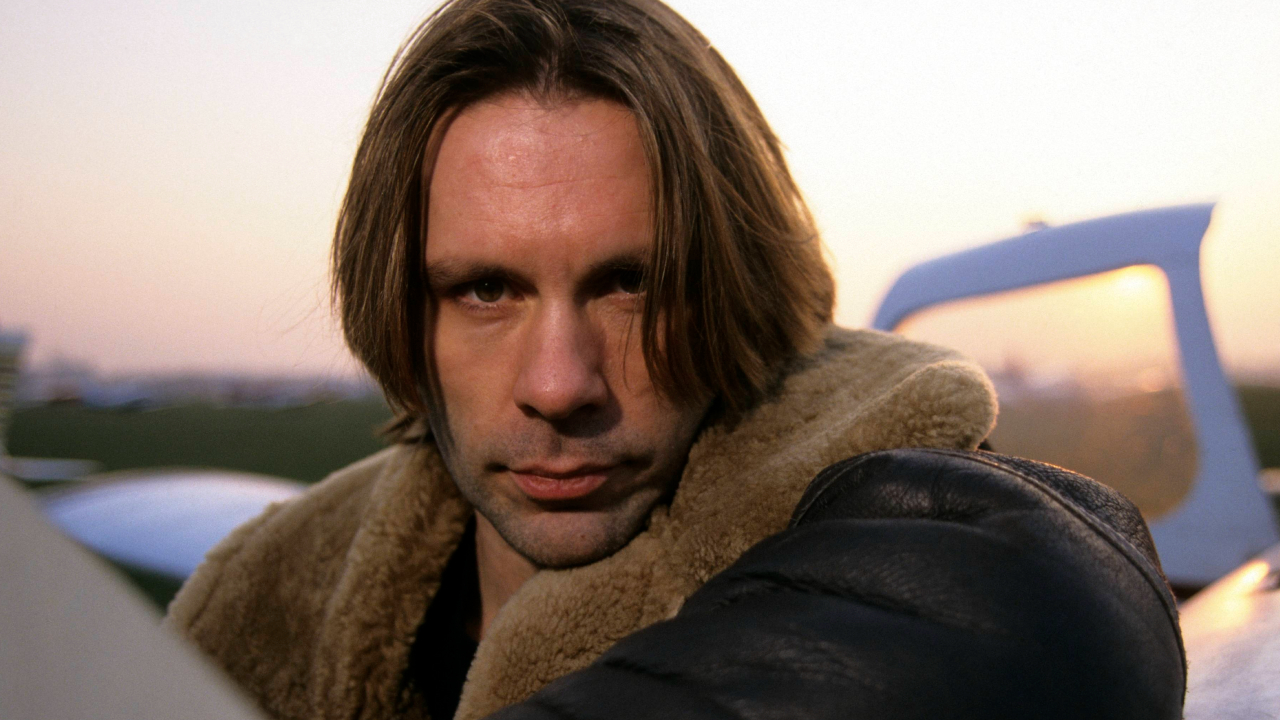BB King: On The Road In '68
In 1968, BB King was at the height of his powers. This classic report captures life in the eye of the storm from a US journalist out on tour with the star...

Select the newsletters you’d like to receive. Then, add your email to sign up.
You are now subscribed
Your newsletter sign-up was successful
Want to add more newsletters?

Every Friday
Louder
Louder’s weekly newsletter is jam-packed with the team’s personal highlights from the last seven days, including features, breaking news, reviews and tons of juicy exclusives from the world of alternative music.

Every Friday
Classic Rock
The Classic Rock newsletter is an essential read for the discerning rock fan. Every week we bring you the news, reviews and the very best features and interviews from our extensive archive. Written by rock fans for rock fans.

Every Friday
Metal Hammer
For the last four decades Metal Hammer has been the world’s greatest metal magazine. Created by metalheads for metalheads, ‘Hammer takes you behind the scenes, closer to the action, and nearer to the bands that you love the most.

Every Friday
Prog
The Prog newsletter brings you the very best of Prog Magazine and our website, every Friday. We'll deliver you the very latest news from the Prog universe, informative features and archive material from Prog’s impressive vault.
In the 1950s and early 1960s, touring black bands regularly played San Francisco’s Fillmore Auditorium – the Fillmore district was the city’s Harlem. So when BB King showed up there for a gig in February 1967, he expected the same old sea of black faces. To his astonishment, a sea of white faces greeted him. Promoter Bill Graham had just started booking the Fillmore for his psychedelic dances and, advised by blues guitarist Mike Bloomfield, he booked BB to give the emerging hippie audience a chance to hear the blues straight from the source.
The hippies loved BB’s blues, and over the next three years, they helped him break through to a national and international audience. Dozens of magazines interviewed him, his singles edged into the charts, and by ’69 he had become the Duke Ellington of the blues, playing and singing better than ever before, his control tighter and his emotional range wider.
“Yes, I’m liking success, all of it,” he said one night in the dressing room.” My music is getting out, and I don’t have to worry where the next dollar is coming from no more. I’m not rich, understand, but farther from the edge than ever before.”
In the fall of ’68 I had travelled with BB in the deep south; there and then the edge was a lot closer./o:p
A cool night breeze blew outside, across the Mississippi and the cane fields that press against the town of Port Allen, Louisiana. Inside the Club Streamline, a bare cinder-block box crowded with chipped, linoleum-topped cafeteria tables, it was noisy, stifling and rank with sweat. BB King was an hour late. He was coming from Mobile, where he had played the night before, and the customers – field workers in collarless shirts, city dudes from Baton Rouge across the river, orange-haired beauticians, oil refinery workers with their wives – were grumbling. “We want BB,” shouted a lady with a heavy sprinkling of gold teeth.
“Deed we do,” answered someone, but Sonny Freeman and the Unusuals, King’s six-piece touring band, kept rolling through Eleanor Rigby. Then from a side door BB’s valet carried in a big red guitar, plugged it into a waiting amplifier, and left it gleaming on a chair in the dim yellow light.
“Lucille is here; BB can’t be far behind,” said the gold-toothed lady.
Sign up below to get the latest from Classic Rock, plus exclusive special offers, direct to your inbox!
The tenor sax player took the mic. “Ladies and gentlemen, it’s show time, and we’re happy to present the star of the show, the king of the blues, Mr BB King.” A wave of clapping washed back to the bar, and a heavyset man in a shiny maroon suit stepped lightly to the stage and picked up the guitar. The band started Every Day I Have the Blues, and BB King, eyes screwed shut and body bent forward, hit a quick chord.
From that instant the very molecules of the air seemed alive; King and his guitar were a magic source of energy from which came fine glistening notes that drew the whole club into their tremulous, hesitant intensity. “Put the hurt on me,” a man yelled. Women jumped up and stood twisting their hips, heads bowed, hands held high in witness. “Evra day, evra day I have the blues,” BB sang, rocking back and forth, both fists clenched beside his head, and the shouting went on.
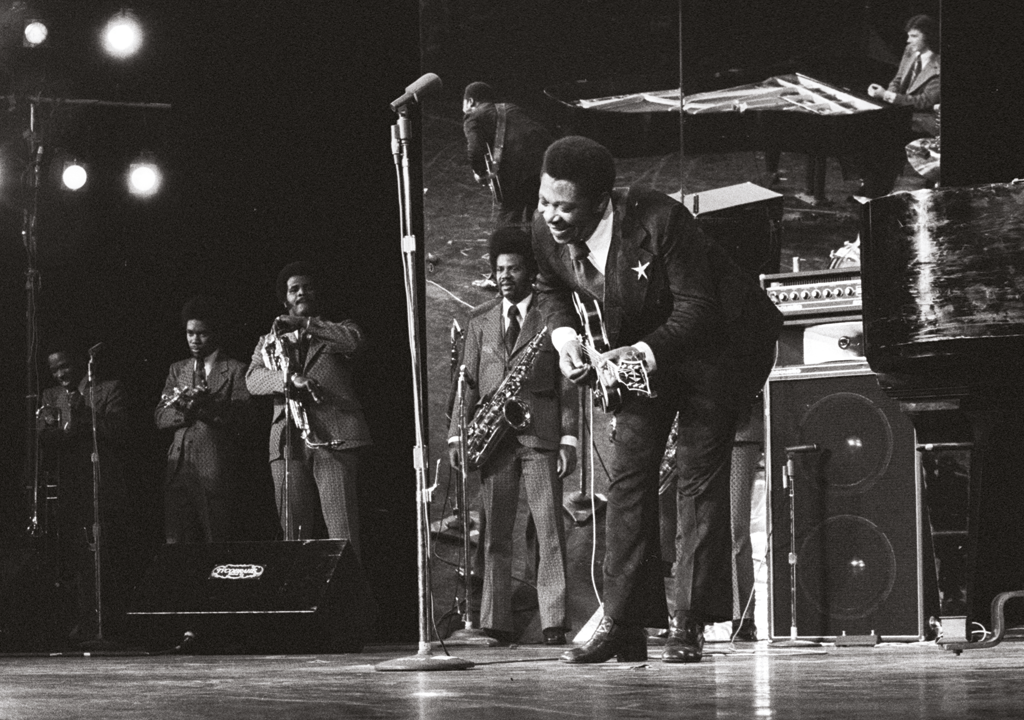
Above: King and his band in the swinging 60s.
“Thank you, ladies and gennulmen,” King said smoothly when he finished, the band riffing gently behind him. “So sorry I’m late, but we’re so glad to have you with us and we hope to he’p you have a good time. If you like the blues, I think you will. Are you ready to get in the alley?”
A deafening roar said yes. He hit a high note that he bent sharp as it faded, then another, then another, the crowd erupted, and he was off again. For an hour he played the blues, rough and smooth, exultant and downhearted, blues that are fresh every time: Rock Me, Baby, Three O’Clock Blues, Don’t Answer The Door, and his classic Sweet Little Angel: ‘I got a sweet little angel…When she puts her wings around me, I get joy and everything.’
But at the break BB wasn’t so happy. Splashing his thick neck with Faberge Brut and touching up his roughly processed hair with Ultra Sheen, both proffered by Wilson, his valet, he moaned about his gas pains. He’d been going to a doctor for his stomach, he told the knot of hangers-on gathered around his dressing-room chair like retainers at a friendly throne, but that doctor hadn’t meant nothing but misery.
“‘No fried or fatty foods,’ he tells me, ‘no salad dressing, no liquor, and no women.’ I told him, I said, ‘Doc, those first things maybe, even liquor, but the last, forget it.’ And he said to me, ‘B, you can say forget it, but the pills I’m givin’ you for your stomach, they gonna make you forget it.’”
He paused to get a chuckle of appreciation from the admirers. It came, and BB smiled too. “I’m not through yet, lemme go on.
“Now I didn’t believe the doctor that some pill was gonna make me forget lovin’, and for three weeks it didn’t, I was goin’ just like always. And then this morning, I was with a sweet gal I been trying to make for 15 years. She finally said the time was right, so there we was, trying to get something done before I had to get up and drive all the way here, and, you know what? Wouldn’t do a thing! Not a blame thing,” and he slapped his thigh, laughter bubbling out of him. “I played with it, she played with it, but it just lay there like a hound,” and he held his index finger out, limply crooked. Everyone backstage broke up laughing, and BB sat there basking in his own joke, his grin wide and loose.
He went back on stage, chuckling, this time in a light green suit, purple turtleneck and gold pendant. It was one o’clock, late for working people on a weekday night, and the club was emptying. But King played on, oblivious of the tables deserted but for bottles and overturned glasses. “Look at him, man,” said Elmore Morris, King’s entr’acte singer for 11 years. “The greatest. It’s the depths he gets to – he knows what they are and how to get to ’em. A mean man or a small man couldn’t do that; takes a real man like B to penetrate like he does.”/o:p
Born Riley B (“I never knew what that B was for.”) King in Itta Bena, Mississippi, he became Riley King, the Blues Boy from Beale Street, when he got his first radio job in Memphis in 1948; in time that got shortened to Blues Boy King and then to BB. “It still means Blues Boy,” he says. “That’s what I am. It’s too late to change.” Now 44, he looks his age but not a day older; there is no stoop in his stance, no gray in his hair, and no tiredness in his bright eyes and lively mouth. His face most often has a calmly mournful quality but can break up in laughter and suddenly have an impishness that just as suddenly disappears. At times, particularly in his Cadillac, he looks like a sober doctor, exuding quiet success, but even then you see in his eyes that he is a bluesman, a man for whom the blues are his sorrow, his power, his essence. “I always start my show with Every Day I Have the Blues,” he says simply, “because it’s true.”
The blues – “American music,” says BB – are hard to define. “If you have to ask, you’ll never know,” some say, others adding more aggressively, “If you ain’t got ’em, don’t mess with ’em.” The passion expressed in blues is, however strong, so subtle that great debates have always raged over which musicians and fans could really (or really, really) play or feel them. Purists believe that the true bluesmen (all black) could be counted on two hands; blues democrats argue that Moses, Beethoven, Ghandi and all disappointed lovers know the blues.
The evidence is on the side of the democrats. As a musical form, the blues emerged less than a hundred years ago out of the peculiar institution of slavery of Africans in America; they are now a metaphor for emotions felt by people all over the globe. Blues are at the essence of a wide range of American musics, and have influenced all modern composers. Whatever bastardised or attenuated idiom or style they get shoved into, they always maintain their integrity against depredation.
The blues are first the music of black Americans. Their technical basics evolved in the meeting of black slave and white master cultures; in time they have accumulated a vast range of meanings, subjects and styles, becoming the aggregate expression of black Americans, detailing every facet of their lives, reflecting every change in their fortunes, and speaking, often obliquely, their self-assertion in a world that tries to trap them in invisibility. The fundamental requirement of the blues is absolute honesty, and they are accurate to the last nuance of black life in America. Aesthetically, they are black America, and to love them, to find expression of oneself in them, is to identify with the black American experience.
That experience is as diverse as the blues, but its unifying fact is displacement – simply not being at home. The blues are the music of a people profoundly alienated, a people making their way in a foreign land – Babylon, Eldridge Cleaver calls it – to which they were brought as captives. On one hand attempting to deal with the cruel or absurd reality facing them as best they can, they are also searching for a surer, more essential reality: their past, their historical, racial and primal selves, the web from which they were ripped. One feels the earnestness of that search, its yearning and frustration, in every blues chorus with its Sisyphus-like climb away from the tonic chord, the brief reaching of an instable peak, and the inevitable fall back to the tonic./o:p
But so powerful is the world black Americans live in that the search must be carried on within its terms. The blues are played on western instruments, but the notes that give blues their emotional tonality are not the “do re mi’’ that white Americans call “the scale.” Guitars are not fretted to include them; “blue notes” are between the keys, as pianists say. A blues musician can only reach them by distorting the sound their instruments were built for: bending a guitar string, fading open trumpet valves, “overblowing” a harmonica or grace-noting across several piano keys. He must twist and restructure the reality he is given to find his way those tones that soothe and inspire him. Using the tools of the west, he over and over again recreates those haunting tones that seem to be an elusive key to a past and self that is remembered only enough to make its disappearance agonising. The tragedy of the blues is that you can’t go home again; their hope is that through them, maybe someday, somehow, you can. And right now you can make wherever you are a lot more homey.
The dialectic of displacement and the yearning for home is universal, a theme as old as man’s expulsion from Eden, new as our own births, yet the popularity of the blues indicates that it has particular relevance today. Did we know it no other way, the worldwide acceptance of the blues would prove that millions of humans now feel robbed of their homes, cheated of their birthrights, lost and oppressed. A lot of people in this world, of all colors and cultures, have the blues.
In a century the blues may be a form like the sonata form, something to be learned from a book. Today they are the living truth. And an American one; while the world is being Americanised (ie, accepting the technology of the white master culture), it is also (maybe therefore?) learning the other side of life, the loneliness of displacement. Blues truth runs counter to hysterical confidence in progress, machines and human power. It is a darker, more fateful, though ultimately more relaxed and humorous truth that has its own sober and sensual comfort. “When it all comes down,” say the blues (here in the words of Memphis Slim), “you gotta go back to Mother Earth.” The blues tell that truth with the ease and grace of folk tales, as well as raunchiness, anger and despair. This simple music bears that truth’s burden because it is not quite an “art,” but the vital creation of very human genius.
King is one of those men. He had been on the road for almost 20 years, but the day when he was a James Brown sex symbol with Top 10 songs has been over for a decade. Soul music, with a heavy beat, gospel influences and glamorous stars, is the staple of the best-selling charts, not the blues as played by older men who won’t change the rhythm to suit the latest dance steps. Blues are “roots”: recognised as the basic source but ignored because they merge into the cultural background. It is the Otis Reddings, Bob Dylans, Rolling Stones and Janis Joplins who, working changes on the blues, get the hits. Even when folk enthusiasts in the late 50s and early 60s were “discovering” blues singers like Son House and Mississippi John Hurt, BB was passed over as too urban and sophisticated. His blues are all music created by city artists in the past 20 years; few date directly from the oral tradition of the country blues singers. But BB, long caught in the middle, is now getting full attention./o:p
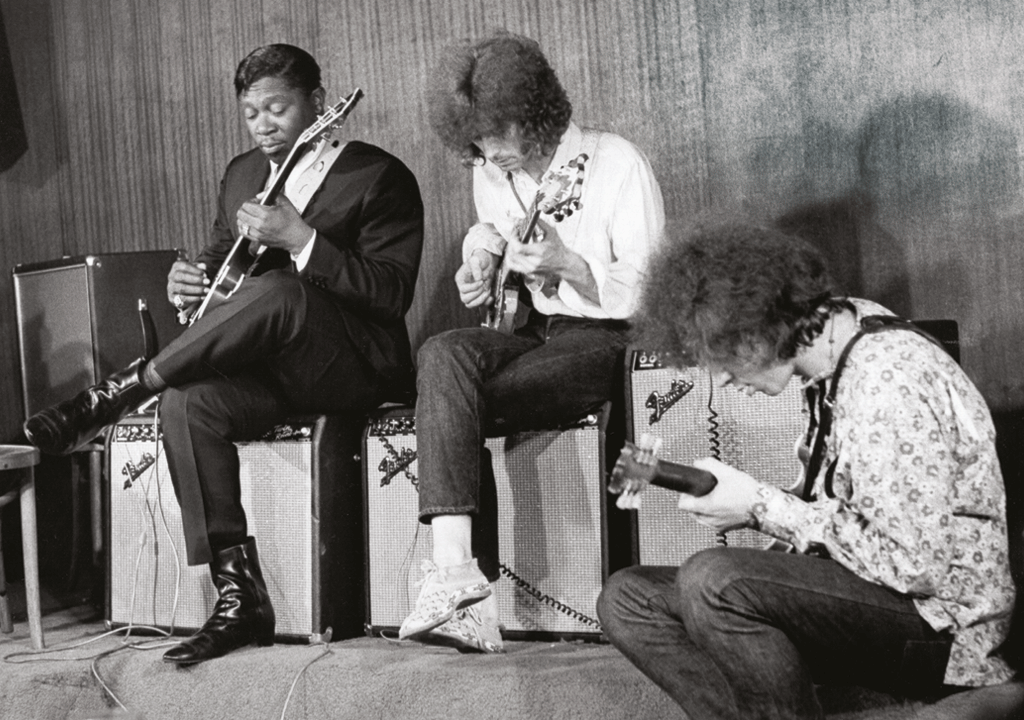
Above: BB King, Eric Clapton and Elvin Bishop in 1967.
On one hand, educated blacks who had scorned the blues as dirty music, an opiate of the people, the result of an oppressed past, are turning to the blues to express their blackness; BB is both funky enough and modern enough for them to dig. “For a Negro to say, ‘BB is my main man,’” Charles Keil wrote in Urban Blues, “is to say, ‘I take pride in who I am.’” On the other, the millions of white kids going deeply into rock’n’roll, led by young white guitarists like Eric Clapton and Elvin Bishop, began to discover the blues in the mid-60s. The touted “New Rock” is as much a blues revival as it is electronic psychedelia. What The Beatles are to the latter, BB is to the former. For blues fans, black and white, not only is King a beautiful musician, he is the essence of the lead guitarist, the soul man alone with his guitar, a breed that for cultists has all the misterioso allure of the cowboy, racing driver or bullfighter. Both audiences recognise BB as a proud and intelligent man, an artist who presents himself with no apologies and no put-ons.
“I’m different from the old blues people,” he says. “I don’t smoke or drink on stage. And unlike the new ones, I don’t dance. I’m just not electrifying. I figure that it’s the singing and the playing the people come for and that’s what I give ’em. My only ambition is to be recognised as one of the great blues singers. If Frank Sinatra can be tops in his field, Nat Cole in his, Bach and Beethoven and those guys in theirs, why can’t I be great and known for it in blues? It’s been a long time, and the fellas that made it before me with the twist and rock, I’m not saying they don’t deserve it, but, I think I do too.”
In Port Allen recognition seemed a long way away. The group had just started 45 straight one-nighters on the “chitlin’ circuit” that would have them crisscrossing the deep south. They would get good crowds because it’s blues country, but they knew they’d been doing it for years and that you don’t make money from people who don’t have it themselves. And that night, right after the Club Streamline promoter said he didn’t have the $650 promised and BB wearily accepted $400, there was trouble.
They left the club at 3am – BB, his road manager Frank Brown and Wilson in the green Cadillac Fleetwood Brougham, the band in a Ford Econovan (a disparity exactly expressive of their business relationship to BB; despite it they are all friends).
They planned to drive the 200 miles to the motel in Mobile by morning, sleep until early afternoon, then drive to Montgomery for the date that night. While they gassed up in Baton Rouge, Wilson and two of the guys in the band, all wearing dashikis, walked over to a cafe for sandwiches and sat down at the counter. No eating at the counter, said the counterman as a dozen white toughs watched over their beers; no take-outs either. “We’re Wallaces here,” shouted a tough. The guys shrugged and started out. “Great, man,” sneered Wilson from the door.
“Whah, you nigger,” said a tough, coming out after him and punching him to the gravel “Git ’em!” cried another, and suddenly a half-dozen whites came outside, one swinging a heavy chain.
The three fought back, and when Frank, a giant, came running and grabbed away the chain, the whites scattered. But tenor sax man Lee Gatling had been stabbed in the arm and trumpeter Pat Williams was bleeding from a chain wound on the forehead. The police who gathered asked a few questions, said they couldn’t find any suspects, and stood under the blue-white gas station lights eyeing the band suspiciously.
King, who had missed the action because he was in the men’s room, quickly took charge, ordering the ambulance, calming his men and talking to the police, but his mind was somewhere else.
“Wanted something to eat, just something to eat, and a man’ll hate you so bad he’d kill you. You think things are getting better,” he said to no one in particular, staring at the “I Have A Dream” stickers on his bumper. “Thought you knew how to get along, never anything like this happen before. Oh, man, this hurts so bad. And they tease me when I sing the blues. Hah! What else can I sing?”
They all waited at the hospital until six before a doctor appeared and said Gatling and Williams were all right. As the sun rose they started for Mobile, getting there, sleepless, in the glare of early afternoon./o:p
BB got a few hours’ sleep in before they started out for Montgomery. The anger of the night before was beginning to recede, and as the Cadillac swept north, he talked about his life. He had told his story before to other interviewers, often in the same words, as if he had saved it all up, knowing it would one day be worth telling. His mother had left his father when he was four, he said, taking him to the Mississippi hills and her churchgoing family. She died a few years later, and he spent his boyhood as a 15-dollar-a-month hired hand for a white tenant farmer until his father found him and took him back to the Delta, where he chopped cotton and drove a tractor on a plantation.
Young Riley had sung in church since he was tiny and learned guitar from a minister uncle, first sneaking the guitar off the bed where the uncle put it while he ate dinner. In the Delta he started singing and playing regularly in a gospel quartet.
At 18 he was drafted and then deferred – the plantation owners wanted good workers on the home front – something BB, who misses having formal musical education, is still bitter about: “If I had been let stay in, I could have gone to music school on the GI Bill.” But deferment meant getting army equivalent pay instead of fieldhand wages and having money in his pocket. “I’d take the extra and buy a bus ticket for as far as it would take me – Jackson, Oxford, even Hattiesburg – and play the blues on street corners, making more on a weekend than I could all week. ’Course, I was sneaking away; playing blues if you were in a sanctified singing group was evil, consorting with the devil. But I didn’t mind cos of the money, and all those cheering me as I played, that made it worth it.”/o:p
After the war Riley moved to Memphis, determined to make it. He lived with his cousin, the great bluesman Bukka White, and landed a 10-minute spot on WDIA, one of the first radio stations anywhere with Negro personnel, advertising Pepticon Tonic and playing his blues. He was immediately popular; by 1949 he had the best-known blues trio in Memphis, his own show as a disc jockey, and his first big record, Three O’Clock Blues, which stayed at the No.1 spot in the rhythm and blues charts for 18 weeks./o:p
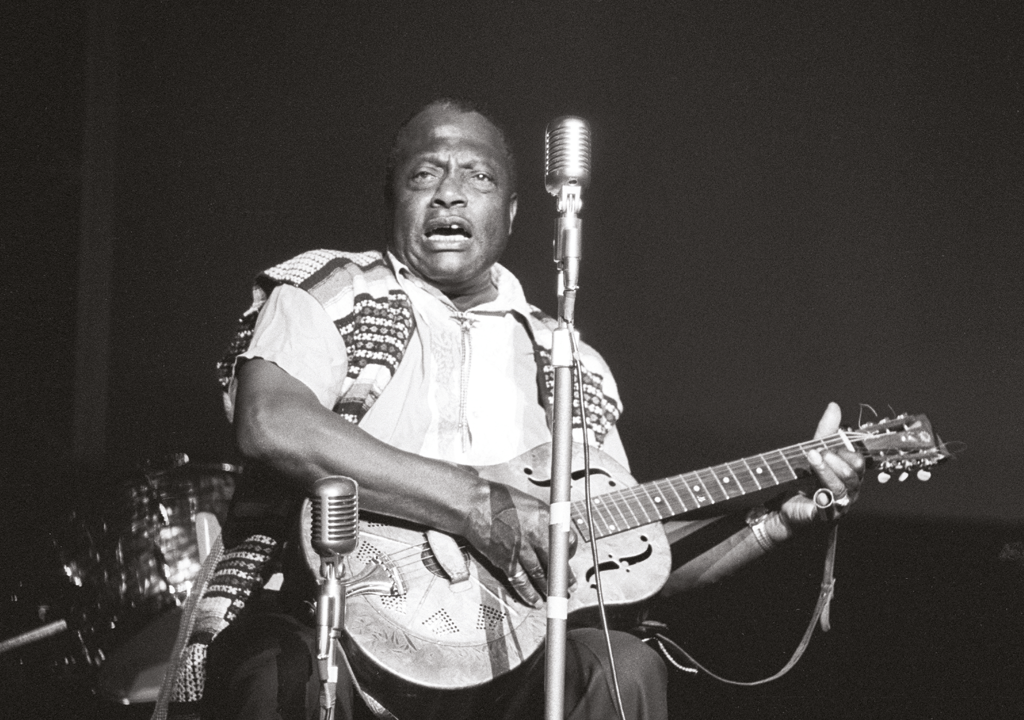
Above: Mr King’s cousin and hero, Bukka White.
“I was a star from then on, getting good guarantees, making every record – Sweet Sixteen, Rock Me, Baby, You Know I Love You – a hit. Always travelling, too. One year we did 342 one-nighters, me and Lucille,” he said, patting the guitar case behind his head. The present Lucille, a red Gibson with gold frets and mother-of-pearl inlay, is Lucille number seven; a label on the case says, “My name is Lucille, I am a guitar. My boss is BB King. Please Handle Me With Care.”
Lucille got her name in a nothing town by the name of Twist, Arkansas. “We were playing some club, and some guys were fightin’ and they knocked over a kerosene barrel and burned the place down. I was almost killed going back in to save my guitar, and when I found out the fight was over a gal named Lucille, I named my guitar that to tell me to keep her close and treat her right.”
The car slipped through miles of forest. Frank had the radio on jazz softly. Harder times came in the late 50s and early 60s.
When Top 40 programing swept radio everywhere, replacing specialty shows like blues hours with solid pop, BB didn’t get much airplay. Most bluesmen either moved to rock or went off the road; blues became the music of country people, the old and the poor. He always had work, but the clubs and money weren’t good, especially compared to the standards set by black stars making it in white markets. He still recorded, but the albums sold for $1.99 on drugstore racks. One car crash wiped out his savings; another almost took off his right arm.
“Then my second wife left me and it like to killed me. I really loved that gal, but she wanted me off the road. I wanted to, too, but I was behind to the government so I couldn’t. She didn’t understand. Just being a blues singer was hard. People thought they were all illiterate, drinking and beating their women every Saturday night. I’d fight for the blues, but they wouldn’t listen, and since I didn’t have school past ninth grade I didn’t feel too confident of myself. I’m still a country boy, a little scared of people who can make you feel bad. It’s like since I was a boy going to bed with no lights cos there was no electricity, I’ve been afraid of the dark.”
That night BB was magnificent. The Montgomery Elks Club, Southern Pride Lodge No. 431, was packed to the walls with a good-time crowd, and he worked for them. His face beaded with sweat, Lucille brought up under his chin, his eyebrows going up and down, BB pulled out the notes, starting solos with just the rhythm of organ and drums, and building slowly to the full power of the band behind him, Lucille always showing the way. When you thought Lucille had said it all, King sang, his voice both tough and vulnerable. Young white audiences marvel at his guitar playing, but for the blacks he is a blues singer, first and last. “I’ve been down-hearted, baby, ever since the day we met,” he began one song softly, ending in full-blown shouting:
Ah gave you a bran’ new Ford,
You said, “Ah wanna Cadillac!”
(BB vamping, hand on hip, gave the girl’s response).
Ah bought you a 10 dollar dinner,
You said, “Thanks for the snack.’’
I let you live in my penthouse,
You said it was just a shack.
I gave you seven children,
An’ now you wanna give ’em back!/o:p
With that women were jumping up and down, men were rolling back in their chairs, all howling at the joke of it, and BB finished, “Our love is nothing but the blues, woman; baby, how blue can you get?” Before cheering had died down he was into a slow and very funky Don’t Answer The Door, that ended in more screaming. And then the next song and the next, fast ones, slow ones, setting up moods and dissolving them for new ones; everything real and true. “There’s no signifyin’ jive with B,” shouted one delirious listener, his glass held up in salute, as King went off.
“I wish they had something could measure the pressure inside a person,” King said in the cramped dressing room. He spoke softly but intensely. “Like at times when you’re in a strong mood, if you’ve been hurt bad by a gal or your best friend. It’s like that when I’m playing and I know exactly what I want to play, it’s a goal I’m trying to reach, and the pressure is like a spell – oh man, I don’t have the words.
“But I know this, I’ve never made it. I’ve never played what I hear inside. I get close but not there. If I did, I’d play the melody so you’d know what it was saying even if you didn’t know the words. You wouldn’t know when Lucille stopped and my voice began.”
A beautiful woman with a wig of rust-colored curls came in. “Hello, B, how are you?” she said.
“Happy to see you, beautiful,” he said with a big smile, and kissed her.
“Haven’t seen you for a year, B. Are you staying over?” she said, rearranging her curls.
“No, baby, we’re going to Atlanta soon as we’re ready.”
She looked crestfallen. They chatted a few minutes and she left.
“Man,” said BB, wiping his brow. “Gonna have to do something about those pills!”
By the car the guys in the band were talking about the fight; they hadn’t stopped talking about it. They couldn’t figure out the why of it. Nothing like it had ever happened to any of them; its ferocity had astonished them. BB joined them.
“You never saw anything like it before, B?” asked one.
Never, and he couldn’t explain it for them, he said, but things are better now. You didn’t stay at Holiday Inns when he started, but in black fleabags; you kept food in the car and relieved yourself beside the road. “If you had that fight a while back, you’d be in jail now. Only one thing I regret about that fight: you fellas didn’t put one of them in the hospital.”
“Next time, B,” said Lee./o:p
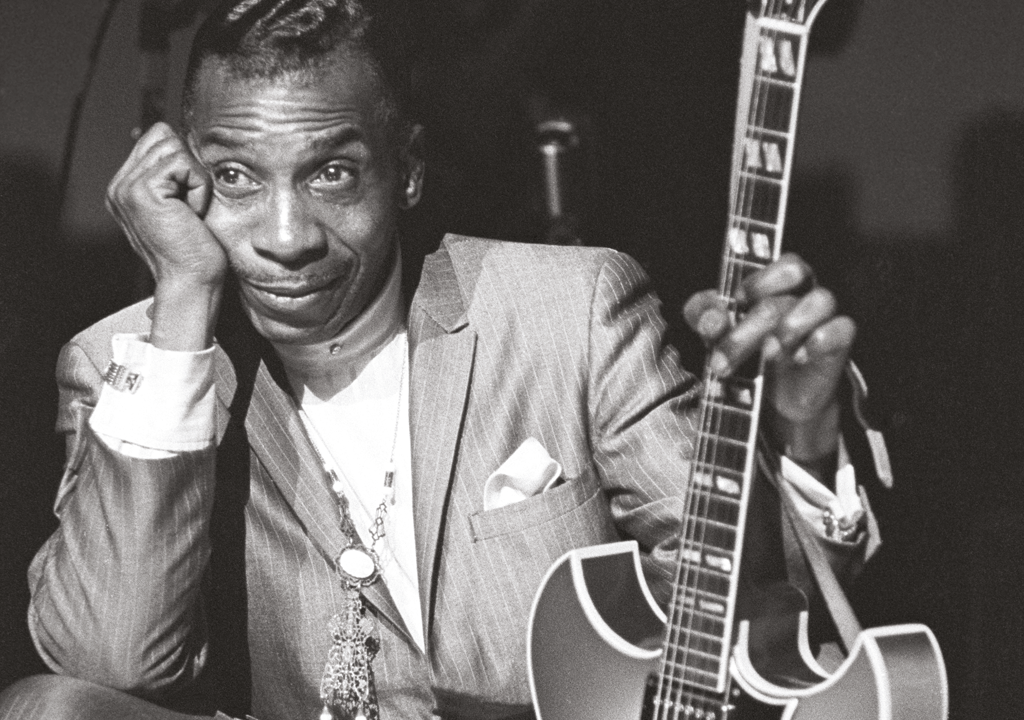
Above: King’s inspiration, ice cool T-Bone Walker.
It was a long drive to Atlanta and BB felt like talking. T-Bone Walker’s clean sound and Elmore James’s swing were his big guitar influences; church preaching for his singing. But he always loved jazz, especially Count Basie. “I just love to swing, man,’’ he said, “and nobody swings like the Count.” Charley Christian’s guitar was an inspiration, but “the man who won my heart” was Django Reinhardt. “He had a singing guitar, gypsy Spanish, soulful. It really filled my soul.”
Classical works are too long for him, but there’s no music, he said, that if he listens to it, he can’t see what it’s getting at, even Japanese Koto music. When he retires he’d like to have a disc jockey show again and play whatever he liked. “All music is beautiful. Man, I got 20,000 records and I never buy ones I don’t like. I even have a record of Gene Autry singing TB Blues. He’s a rich man now but there was a time when he was saying something.
“Old bluesmen, they didn’t listen to anything but blues; I do and I’m more polished than them. But blues can’t be too polished; they have to be raw and soulful. They started with a fella singing to you like he was telling you a story; if he kept up the tempo, he could make a chorus 15, even 20 bars long if he wanted to say his piece. I was like that, but when I got a band I had to stay within 12 bars to keep with the other fellas. And man, those bars went flyin’ by! But blues can’t be perfect. A lotta white people can’t sing the blues because their English is too good. Blues and correct English don’t sound right. You gotta break the verbs for it to be blues.
“Some say the blues are backward, but I think they can he’p black people now. If something is bothering you and you got a friend, it he’ps if you can talk about it. It may not solve it, but it he’ps. You can talk about your problems in the blues and you find people have the same problems, and then you can do something. Blues words are usually about men and women, because that’s where it all starts – men do most things on account of women – but if you hear the blues, you know it’s about a lot more.”
BB doesn’t have a home; Memphis is home base, and he has a farm there that his father lives on, but in Memphis, as elsewhere, home is the motel room he’s in. The one in Atlanta looked it. Spilled over the bed, tables, floor and sink were briefcases full of contracts, letters, unfinished songs, notes for a book he called How I Play The Blues by BB King, an electric pan in which he makes oatmeal for his ailing stomach, a tape recorder, a tape-cassette-radio, a dozen changes of street clothes and another dozen stage outfits, books about flying (BB is almost qualified as a pilot), two big red volumes of Joseph Schillinger’s System of Musical Composition from which he is learning to write his own arrangements, copies of Billboard and soul-music magazines, and empty packs of Kools. “I’ve been doing this a while,” he said, padding around the piles in his black silk underwear. “I own an apartment building in Memphis, wouldn’t mind moving in, but whites live there, and if I moved in, they’d move out and my property wouldn’t be worth a thing. That’s the truth.”
He found what he was looking for, a sheaf of unfinished songs. “This one I’ve been working on. It says what I think about myself. ‘I ain’t no preacher, not trying to be no saint, because I don’t get high every day, don’t mean I don’t take a drink.’ That’s all now, but it’s gonna be a song saying, ‘I’m just BB, take me as I am.’
“Maybe soon I’ll just work weekends, maybe even have a club of my own. I got four kids by various women; they’re all grown and have children. Maybe I’ll enjoy my grandchildren like I never had a chance to with my own. But I’ll never stop playing. As long as people’ll hear me, I’ll keep playing.”
The next date was at the Lithonia Country Club, a place at the end of a dirt-road maze 20 miles from Atlanta. “This is a real funk,” said Sonny Freeman, unbelievingly. The club, a shack, was half empty, the decor made the Club Streamline look like the Stork Club: bare wooden chairs and tables, a cracked cement floor and a stage, incongruously lined with ripped tin foil, lit by one fixed spotlight.
It was a tough night; the audience seemed to like the blues but just wouldn’t clap. “You know we’re working hard for you,” BB pleaded several times. “Whyncha’ beat your hands together for us,” but all he got was desultory applause.
“Man, you see what it’s been like for us all these years,” he said at the break. “It’s so hard when people ain’t with you. But if they can’t be satisfied, man, I play for my own satisfaction.”
He did. Coming back on at midnight, the club even emptier than when he had begun, he played roughly, slashing his pick across the strings in harshly vibrant chords, even breaking two strings. But as he was bringing the show to a close, he changed moods. Singing in a pure falsetto, leaving the roughness behind, he made his voice all sweet pleading.
“Worry, worry, worry; worry’s all I can do,” he sang, his head uptilted, the light glinting off the diamond BB ring on his left hand. “My life is so miserable, baby, and it’s all on account of you.”
The riffing of the band built through the second chorus and exploded as he started the third. “Someday, baby,” he sang, his voice almost squeaking, “someday, baby, someday, baby.” He stood there, a big, powerful man on a sagging stage lost in the scrub woods of Georgia, singing to 30 people, all black, poor, middle-aged or old, a little drunk, and only a few hours away from work the next day, singing “Someday, baby,” as high as he could over and over again. One knew that for every “Someday, baby” he sang, there were many somedays on his mind. Finally, he came to the last one: “Someday baby, when the blindman calls my name, you won’t be able to hurt me no more, woman, cos my heart won’t feel no more pain.”
He said his thank-you’s, left the stage, changed, thanked the band for playing well (as he does every night ) and got into the Cadillac, turning on the portable television he keeps plugged into the cigarette lighter.
“What’s happening?” he asked Frank, who has been driving for him for 10 years, as they pulled out.
“Another day done passed by,” said Frank./o:p
It was a fine social night backstage at the Fillmore West after a year of days passed by.
BB’s stomach troubles were long gone. Two lovely young women had dropped by especially to see him; a huge black man named Ernie who he had once played with in Memphis was there and had brought a fifth of scotch. BB sent out for some beer. Someone else was passing around a goatskin flask of red wine.
When everyone was pretty high, three young black men came to the door and shyly asked if they could enter. BB waved them in and offered one his seat. No, they said, they didn’t want to take up his time, but they were representatives of the San Francisco State Black Students Union, and they wanted to tell BB that they thought he was the greatest, a real soul brother who told it without any jive. He thanked them, but their manner somehow implied a “but,” and he waited for them to go on.
“I hope this isn’t rude,” said one, “but I wanted to ask you, if it’s not too personal, why you now wear your hair natural.”
“I’ll tell you,” said BB. “Because I’m beginning to get a feeling for who I am. I had a process for years, partly because it was the fashion and cos I thought it looked good, but I always knew it wasn’t quite right; it was a mask I wore to hide something. Now I don’t feel I need it any more.”
Another one said it was still pretty short, but BB said he had it the way he wanted it. The tall thin BSU-er, whose name was Tony and who seemed to be the leader, asked if BB would play for the BSU. Not this trip, he said, and they’d have to wait until he was in California again, but he’d be glad to do it free. Tony didn’t quite seem to trust him; BB said he was a man of his word; Tony looked doubtful, and then the conversation started to get a little ugly.
It was hard to tell what the students wanted. They kept needling him with questions, often all three speaking at the same time, bursting out with an impatience both nervous and angry. What was success, why did he play for whites, did he think whites understood the blues, what was the blues, did everyone have them or only black people, did he think black people had suffered more than any other race, did he believe in violence? They were at once apologetically self-abasing, acting as if their questions were unloaded, and openly antagonistic. BB was remarkably polite. He knew a lot of white people who were worse off than blacks, he said, and what the students knew from books about plantation life he knew from his own life. He had walked, he reckoned, about 60,000 miles behind a mule ploughing cotton. But they cut him off before he could finish, and he pleaded in vain to speak his mind.
“You say you lived on a plantation,” screamed one student, “but was your mother and wife raped before your eyes?”
“You know they weren’t because I’m still alive,” said BB,” and that would only happen over my dead body.”
“But that’s the blues,” shouted another student, “and that never happened to no white man.”/o:p
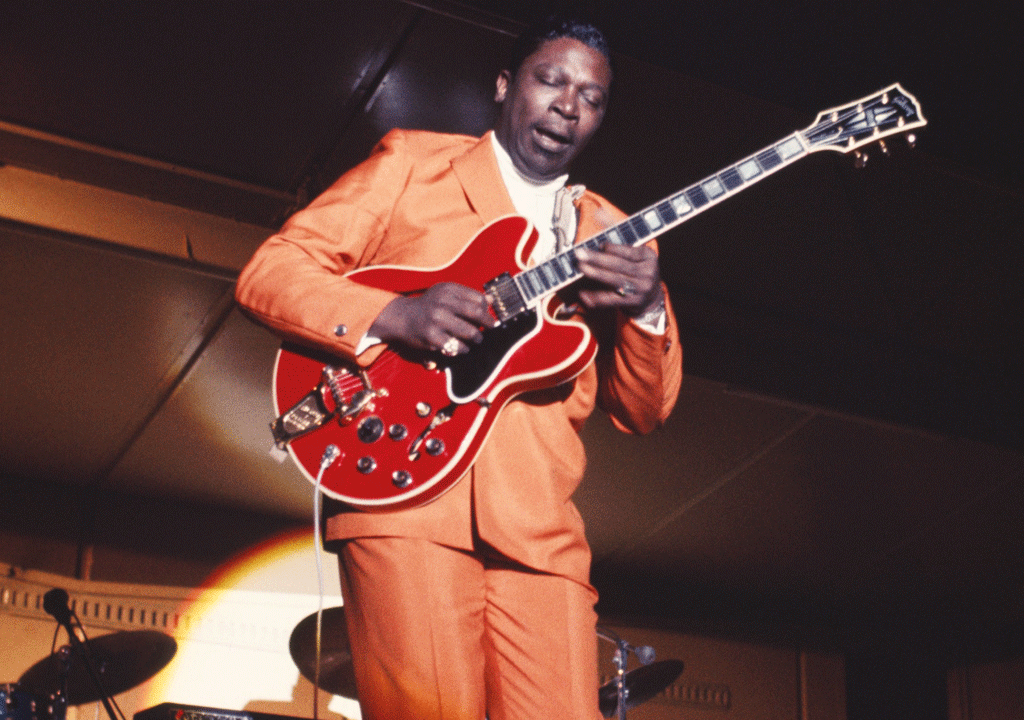
“You come here to ask me about the blues, and then tell me what they are?” BB asked in disbelief.
“But how can you really have ’em if you say anybody can have ’em? “ said Tony.
“I didn’t say anybody, I just said no race got a monopoly on suffering,” said BB.
They continued at an impasse for 20 minutes, a strange spectacle: young men whose own sense of pride and dignity as humans and blacks had in large measure been awakened by BB’s artistry having to reinforce that still shaky confidence by attacking him. Finally they were almost calling him an Uncle Tom. For the first time, he showed anger.
“Listen,” he said. “I’ve got only one more thing to say. You’re upset now, but it don’t bother me. You know a lot more about who you are than I did at your age, and I’m proud of you. You are going to be leaders and we need leaders. But there’s one word I don’t want you to forget, and that’s justice. Be just. Please be just. That’s the lesson of suffering and it’s the lesson of the blues. I try to be just when I play my song, and if you can’t be just, that’s when you don’t really know the blues.”
“But, but,” Tony started to stammer.
“No buts,” said BB. “Now let’s shake hands and don’t bother me no more.”/o:p
Interview taken from The BB King Reader: 6 Decades Of Commentary, compiled by Richard Kostelanetz and published by Hal Leonard.
